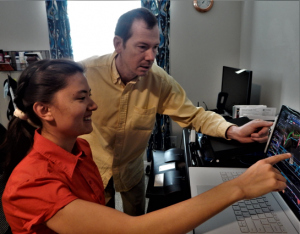News
Presbyterian College Student Receives NASA Award to Research Magnetic Storms
“Everyone is familiar with changes in the weather on earth, but most don’t realize that there is also weather in space,” said PC sophomore Grace Wanliss.
Wanliss and sophomore Marigordon Varner received research awards from NASA worth $7500 each. The students will conduct research this summer. Grace will research with Dr. James Wanliss, her father and professor of physics.
Out-of-this-World Research
“Space is not empty, but contains plasma,” Grace said.
“Space weather has much to do with plasma and electromagnetic interactions. The plasma is ‘filled’ with electric and magnetic fields that ‘blow’ from the sun in something called the solar wind.
“The most intense space weather is called a magnetic storm, and that happens around our planet when the solar wind strikes the earth.”
This space weather influences life on many levels. An astronaut in space may be harmed and even die if subject to severe space weather, Grace says.
Impacting the Earth
The weather in space affects the weather on earth too.
“Space weather affects power grids, communications, navigation, and other important technologies on the planet,” Grace said. “The goal of my research challenge is to use machine learning algorithms to forecast space weather models for forecasting purposes.”
Grace will use data from NASA’s Advanced Composition Explorer and NOAA’s Deep Space Climate Observatory (DSCOVR) missions.
“Practical and useful” Research
Grace plans to become an accountant after graduating from PC. Still, she says the research is “practical and useful.”
“I am able to sharpen valuable skills such as attention to detail, mathematical reasoning, and an inquisitive mind.
“We’re always faced with problems and unanswered questions: Scientific research cultivates an ability and aptitude to search out logical answers.”
Learn More
Visit Student Research for more about research opportunities at PC.

























